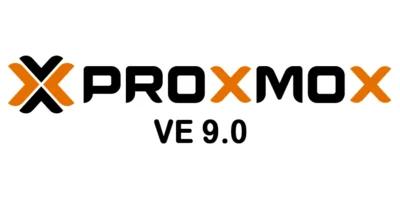
Press Release (ePRNews.com) - VIENNA, Austria - Aug 05, 2025 (UTC) - Proxmox Server Solutions GmbH, a leading provider of open-source server solutions, proudly announces the release of Proxmox Virtual Environment (VE) 9.0, marking a significant milestone in its 20-year journey of innovation. This major release, built on Debian 13 “Trixie” and powered by Linux Kernel 6.14.8-2, introduces cutting-edge features that enhance storage flexibility, networking capabilities, and overall performance for both enterprise and home lab users.
Key Highlights of Proxmox VE 9.0
1. Modernized Core with Debian 13 “Trixie”
Proxmox VE 9.0 is based on Debian 13 “Trixie,” providing a robust and secure foundation with updated libraries and improved hardware support. The Linux Kernel 6.14.8-2 ensures compatibility with next-generation AMD and Intel processors, PCIe 5.0, NVMe, and modern networking chipsets, delivering enhanced performance and reliability.
2. Snapshot Support for Thick-Provisioned LVM Storage
A highly anticipated feature, Proxmox VE 9.0 introduces snapshot support for thick-provisioned Logical Volume Manager (LVM) shared storage, such as those connected via iSCSI or Fibre Channel to Storage Area Networks (SANs). This breakthrough enables seamless snapshot management for virtual machines (VMs) on enterprise-grade SAN infrastructure, eliminating the need for complex workarounds and making Proxmox a stronger alternative to VMware and Hyper-V in traditional data centers.
3. Advanced Software-Defined Networking (SDN) with Fabrics
The introduction of SDN Fabrics allows administrators to configure complex, scalable network architectures, such as two-layer spine-leaf topologies or full-mesh Ceph clusters. This feature enhances network redundancy and performance, supporting automatic failover across Network Interface Cards (NICs) for high-availability environments.
4. Ceph Squid 19.2 Integration
Proxmox VE 9.0 adopts Ceph Squid 19.2.3 as the default, offering improved performance and simplified deployment through the Proxmox GUI. Users upgrading from Ceph Reef or Quincy must first transition to Squid before upgrading to VE 9.0, ensuring a smooth integration with hyper-converged infrastructure.
5. Enhanced LXC with Version 6.0.4
Linux Containers (LXC) in Proxmox VE 9.0 benefit from LXC 6.0.4, which introduces enhanced resource isolation, cgroup v2 integration, and improved networking. This makes container-based virtualization more efficient and secure, particularly for hybrid clusters. Note that legacy cgroup v1 is no longer supported, requiring containers running older OS versions (e.g., CentOS 7, Ubuntu 16.04) to be migrated to newer versions before upgrading.
6. ZFS 2.3.3 with RAID-Z Expansion
Proxmox VE 9.0 includes OpenZFS 2.3.3, which supports RAID-Z expansion, allowing users to add new devices to existing RAID-Z pools with minimal downtime. This feature enhances storage scalability for growing virtualization environments.
7. Improved Backup and Restore Performance
Integration with Proxmox Backup Server (PBS) has been optimized, with parallel data chunk retrieval significantly speeding up restore times, especially for large VMs over fast LAN or 10GbE setups. Environment variables allow fine-tuning based on network and disk speeds.
8. Streamlined VM Disk Imports
The enhanced Web UI simplifies importing VM disks from external sources, such as VMware, during VM creation. This feature supports various storage backends and is particularly efficient with network file systems like NFS, making migrations faster and more intuitive.
9. Additional Enhancements
- QEMU 10.0.2: Offers high-efficiency VM execution, improved live migration, and better NUMA awareness for optimized performance.
- High-Availability (HA) Affinity Rules: New rules allow precise control over HA resource placement across nodes, enhancing cluster management.
- Security Improvements: The non-free firmware repository is enabled by default for automatic microcode updates, and cgroup v2 ensures modern container security.
- Revamped Mobile UI: A modernized mobile interface improves management on the go.
Upgrade and Installation
Proxmox VE 9.0 supports seamless upgrades from version 8.4 via the apt package manager, using the pve-test repository for the beta and the stable repository for the final release. Users are strongly advised to create and verify backups using Proxmox Backup Server before upgrading, especially for clusters or systems with custom configurations. Installation on Debian 13 “Trixie” is also supported, with detailed instructions available at the Proxmox wiki.
For hyper-converged Ceph setups, users must upgrade to Ceph Squid 19.2 before proceeding with the Proxmox VE upgrade. Compatibility with older hardware (released ≥10 years ago) may require testing, as some CPUs, like AMD Opteron 2427, have reported issues.
Availability and Licensing
Proxmox VE 9.0 is available for download as an ISO image for bare-metal installations, complete with all management tools and a user-friendly web interface. The platform remains free and open-source under the GNU Affero General Public License, v3. Enterprise users can opt for a subscription-based support model, which provides access to the tested Enterprise Repository and technical support.
Looking Ahead
The stable release of Proxmox VE 9.0, announced on August 05, 2025, follows a successful beta phase, addressing critical bugs and stabilizing new features. The Proxmox team continues to innovate, with future milestones like native load balancing on the roadmap, though not yet confirmed for this release.
For more details, visit the Proxmox website, release notes, or download page.
About Proxmox Server Solutions GmbH
Founded in 2005, Proxmox Server Solutions GmbH develops open-source virtualization and backup solutions, empowering businesses, universities, and home lab enthusiasts worldwide. With a focus on simplicity, reliability, and performance, Proxmox VE is a trusted alternative to proprietary hypervisors.





